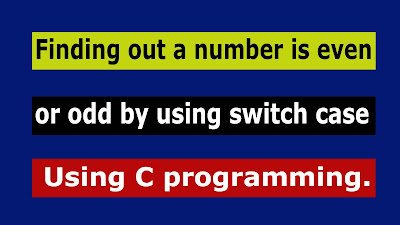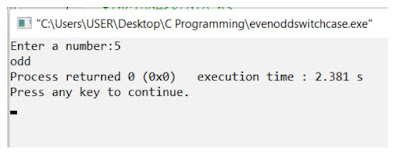Problem : Finding out a number is even or odd by using switch case.
Solution:
Introduction: In this problem, we found out one a number is even or odd by using switch case
through C programming by using codeblocks. Each instruction in a C program is written as a
separate statement. C has no specific rules for the position at which a statement is to be written in
a given line. That’s why it is often called a free-form language. #include is a preprocessor directive.
Then we used int main ( ) with a {}. We used it to start our programming We used printf ( ) to
show data, information etc. on the screen. We used scanf for taking input from the user. We used
int here to two one variables. Here, n for the number which is given by user.
Code:
#include<stdio.h>
int main()
{
int n,r;
printf("Enter a number:");
scanf("%d",&n);
r=n%2;
switch(r){
case 0:
printf("Even");
break;
case 1:
printf("odd");
break;
}
}
Output:
Discussion: We successfully run the program by using codeblocks. Here, we took n= 5 and it
was an odd number which was seen on the display automatically and the result was absolutely
correct .So, we could see that by using C programming we can find any number weither it was
even or odd without any possibility of any kind of error.
Problem : Finding out a natural numerical sum using for loop.
Solution:
Introduction: In this problem, we found out one a number is even or odd by using switch case
through C programming by using codeblocks. Each instruction in a C program is written as a
separate statement. C has no specific rules for the position at which a statement is to be written in
a given line. That’s why it is often called a free-form language. #include is a preprocessor directive.
Then we used int main ( ) with a {}. We used it to start our programming We used printf ( ) to
show data, information etc. on the screen. We used scanf for taking input from the user. We used
int here to two variables. Here, we have write a condition in for loop.
Code:
#include<stdio.h>
int main(){
int i,n=0;
for(i=1;i<=100;i++)
{
printf("%d+",i);
n=n+i;
}
printf("total %d",n);
return 0;}
Output:
Discussion: We successfully run the program by using codeblocks. The result was seen on the
display automatically and the result was absolutely correct. So, we could see that by using C
programming we can find any numerical sum without any possibility of any kind of error.
Introduction: In this problem, we found out one a number is even or odd by using switch case
through C programming by using codeblocks. Each instruction in a C program is written as a
separate statement. C has no specific rules for the position at which a statement is to be written in
a given line. That’s why it is often called a free-form language. #include is a preprocessor directive.
Then we used int main ( ) with a {}. We used it to start our programming We used printf ( ) to
show data, information etc. on the screen. We used scanf for taking input from the user. We used
int here to two variables. Here, we have write a condition in for loop.
Code:
include<stdio.h>
int main(){
int i,m=1;
for(i=1;i<=5;i++){
printf("%d*",i);
m=m*i; }
printf("total %d",m);
return 0;}
Output:
Discussion: We successfully run the program by using codeblocks. The result was seen on the
display automatically and the result was absolutely correct. So, we could see that by using C
programming we can find any numerical sum without any possibility of any kind of error.
Problem : Take an integer from the user determine that number is prime or not prime.
Solution:
Introduction: A prime number is a positive integer that is divisible only by 1 and
itself. For example: 2, 3, 5, 7, 11, 13, 17. If n is perfectly divisible by i, n is not a
prime number.In the program, a for loop is iterated from i = 1 to i <= n.In each
iteration, whether n is perfectly divisible by i is checked using.
Code:
#include <stdio.h>
int main() {
int n, i, c = 0;
printf("Enter number n:");
scanf("%d", &n);
for (i = 1; i <= n; i++) {
if (n % i == 0) {
c++;}}
if (c == 2) {
printf("n is a Prime number");}
else {
printf("n is not a Prime number");}
return 0;}
Output:
Discussion: In this program we have studied about “printf, float, + operator, return
0 ”. Our primary goal was to print the result of area of a circle as an output. The
program ran in 5.421 seconds successfully. Thus, it can be observe that the whole
program was complete righteous.









Post a Comment